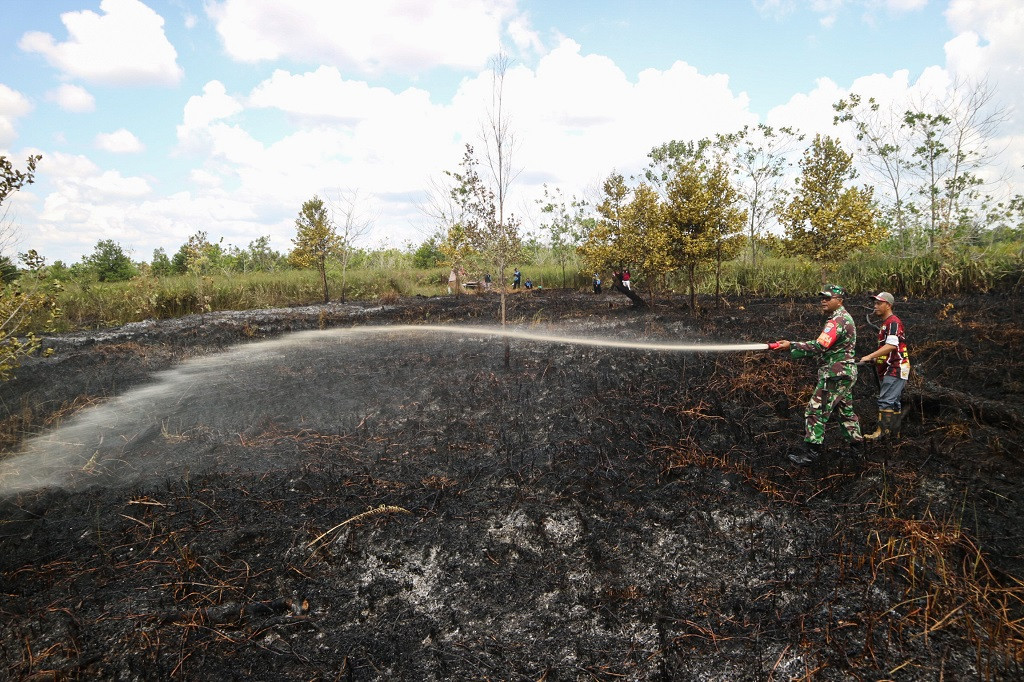Popular Reads
Top Results
Can't find what you're looking for?
View all search resultsPopular Reads
Top Results
Can't find what you're looking for?
View all search resultsSupreme Court fines company Rp 920 billion over West Kalimantan forest fires
Change text size
Gift Premium Articles
to Anyone
T
he Supreme Court has ordered a palm oil company to pay Rp 920 billion (US$60.9 million) for failing to prevent or extinguish forest fires within its concession area in West Kalimantan, adding to a growing list of firms held responsible for environmental disasters in the country.
The court’s justices upheld on July 3 a lower court’s ruling that oil palm plantation firm PT Rafi Kamajaya Abadi (RKA) was responsible for fires in its concession area in Melawi regency, West Kalimantan, between 2016 and 2019.
The Environment and Forestry Ministry filed the lawsuit against the company in December 2021 for the burning of 2,560 hectares of land within its concession. The ministry won the case in the Sintang District Court and the Pontianak High Court, both in West Kalimantan. The courts ordered the company to pay the Rp 920 billion fines, which included Rp 731 billion to restore the scorched land.
The company then filed its ultimately unsuccessful appeal with the Supreme Court.
Read also: Half of fire risk peatland in concessions areas, report says
Rasio Ridho Sani, the ministry’s law enforcement director general, applauded the ruling. He called it “a lesson for all corporations that burn land and forests” in a written statement on Wednesday.
Rasio said the fires that had broken out in PT RKA’s concession area had impacted public health, caused damage to the land that resulted in biodiversity loss and undermined Indonesia’s climate pledge.
In its new, enhanced Nationally Determined Contribution (NDC), the country has committed to bring its emissions 32 percent below the projected business-as-usual level by 2030 using its own resources or 43 percent below that level with international cooperation.
One of the main programs to reach that goal is the Forestry and Other Land Use (FOLU) Net Sink initiative, which seeks to have the forestry and land sector absorb more carbon than it emits by 2030.
Slow execution
The next step is for the ministry to enforce the ruling.
“I have ordered the ministry’s lawyer to coordinate with the Sintang District Court head to execute the ruling, which includes seizing the company’s assets,” Rasio said.
The ministry has filed lawsuits against 22 companies it says are responsible for forest and land fires, 13 of which have been ruled on by the court.
But the enforcement of these rulings has been slow. One example is the case against palm oil company PT Kallista Alam.
The Supreme Court fined the company Rp 366 billion in 2015 for illegally burning large parts of the Tripa forest in Aceh. The ruling, which was final and binding, also stipulated that if the company failed to voluntarily pay the fine, the district should seize its assets to fund the restoration of the burnt land.
But more than seven years later, the company has not paid any portion of the fine and is still cultivating oil palms in its concession area, Kompas has reported.
Read also: Higher forest fires risk as Indonesia heads to potentially dry 2023
Bambang Hero Saharjo, a forestry expert from the Bogor Agricultural University (IPB), welcomed the Supreme Court’s ruling against PT RKA but noted the importance of enforcing the ruling in short order to fund the land’s restoration.
“If the restoration is delayed by five or six years, it’s going to cost us more than if we restore it now, when the ruling is final and legally binding,” he added.
The Environment and Forestry Ministry will study the Supreme Court’s decision and develop an enforcement plan once it receives a copy of the ruling, said Jasmin Ragil Utomo, the ministry’s environmental dispute settlement director.
Jasmin added that the ministry would not stop filing criminal or civil charges against companies it believed were responsible for forest and land fires within or around their concession areas. (kuk)










